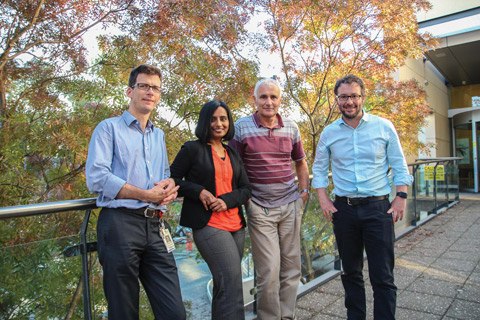Search
Research
Vaccine discussions in pregnancy: interviews with midwives to inform design of an intervention to promote uptake of maternal and childhood vaccinesWe explored midwives' attitudes and values regarding maternal and childhood vaccination, their perceived role in vaccine advocacy
Research
Is immunisation education in midwifery degrees adequate?Midwifery university education is an important arena for developing future vaccine advocates
Research
Bacille Calmette-Guérin vaccine reprograms human neonatal lipid metabolism in vivo and in vitroVaccines have generally been developed with limited insight into their molecular impact. While systems vaccinology enables characterization of mechanisms of action, these tools have yet to be applied to infants, who are at high risk of infection and receive the most vaccines. Bacille Calmette-Guérin (BCG) protects infants against disseminated tuberculosis (TB) and TB-unrelated infections via incompletely understood mechanisms.
Latest news & events at the Wesfarmers Centre of Vaccines & Infectious Diseases.
Research
Vaccine decision-making begins in pregnancy: Correlation between vaccine concerns, intentions and maternal vaccination with subsequent childhood vaccine uptakeAmongst pregnant Australian women we aimed to ascertain vaccine information received, maternal immunisation uptake and attitudes and concerns regarding vaccines

News & Events
Vaccine surveillance brings safety reassuranceIn 2010, a large number of children experienced febrile convulsions after receiving the FluVax vaccination and many parents began to question its safety.

News & Events
Australian parents oblivious to true danger of the fluNew research investigating the devastating impact of the 2017 flu season by PAEDS-FluCAN, a national collaboration observing influenza in children, confirmed it was time to take action after thousands of children were hospitalised with the virus last year.

News & Events
Institute celebrates eradication of rubella in AustraliaThe eradication of rubella in Australia is evidence of the vital role vaccinations play in protecting our health, researchers at The Kids Research Institute Australia say.
News & Events
Time running out to prepare for flu seasonPeople are being urged to ensure they've had their vaccination with the 'flu season expected to hit in Western Australia within weeks.
Research
Assessing the Impact of Pneumococcal Conjugate Vaccine Immunization Schedule Change From 3+0 to 2+1 in Australian Children: A Retrospective Observational StudyIn mid-2018, the Australian childhood 13-valent pneumococcal conjugate vaccine schedule changed from 3+0 to 2+1, moving the third dose to 12 months of age, to address increasing breakthrough cases of invasive pneumococcal disease (IPD), predominantly in children aged >12 months. This study assessed the impact of this change using national IPD surveillance data.
